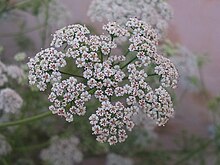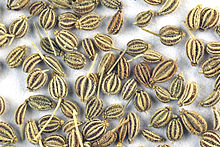Ajwain
| Ajwain | |
|---|---|

| |
| Flowers of Trachyspermum ammi | |
| Scientific classification | |
| Kingdom: | Plantae |
| Clade: | Tracheophytes |
| Clade: | Angiosperms |
| Clade: | Eudicots |
| Clade: | Asterids |
| Order: | Apiales |
| Family: | Apiaceae |
| Genus: | Trachyspermum |
| Species: | T. ammi
|
| Binomial name | |
| Trachyspermum ammi | |
| Synonyms[1][2] | |
Ajwain, ajowan[3] (/ˈædʒəwɒn/), or Trachyspermum ammi—also known as ajowan caraway, bishop's weed,[4] or carom—is an annual herb in the family Apiaceae (or Umbelliferae). Both the leaves and the seed‑like fruit (often mistakenly called seeds) of the plant are consumed by humans. The name "bishop's weed" also is a common name for other plants. The "seed" (i.e., the fruit) is often confused with lovage "seed".[5]
Description

Ajwain's small, oval-shaped, seed-like fruits are pale brown schizocarps, which resemble the seeds of other plants in the family Apiaceae such as caraway, cumin and fennel. They have a bitter and pungent taste, with a flavor similar to anise and oregano. They smell almost exactly like thyme because they also contain thymol, but they are more aromatic and less subtle in taste, as well as being somewhat bitter and pungent. Even a small number of fruits tends to dominate the flavor of a dish.[5]
Cultivation and production
The plant is mainly cultivated in Iran and India.[5] Rajasthan produced about 55% of India's total output in 2006.[6]
Culinary uses
The fruits are rarely eaten raw; they are commonly dry-roasted or fried in ghee (clarified butter). This allows the spice to develop a more subtle and complex aroma. It is widely used in the cuisine of the Indian subcontinent, often as part of a chaunk (also called a tarka), a mixture of spices - sometimes with a little chopped garlic or onion - fried in oil or clarified butter, which is used to flavor a dish at the end of cooking. It is also an important ingredient for herbal medicine practiced there. In Afghanistan, the fruits are sprinkled over bread and biscuits.[7]
As a medication
Despite considerable preliminary research, there is little high-quality clinical evidence that ajwain has anti-disease properties in humans.[8] Ajwain is sold as a dietary supplement in capsules, liquids, or powders.[8] An extract of bishop's weed is manufactured as a prescription drug called methoxsalen (Uvadex, 8-Mop, Oxsoralen) provided as a skin cream or oral capsule to treat psoriasis, repigmentation from vitiligo, or skin disorders of cutaneous T-cell lymphoma.[8][9] Because methoxsalen has numerous interactions with disease-specific drugs, it is prescribed to people only by experienced physicians.[9]
Ajwain is used in traditional medicine practices, such as Ayurveda, in herbal blends in belief it can treat various disorders,[8][10] but there is no evidence or regulatory approval that oral use of ajwain in herbal blends is effective or safe.[8]
Adverse effects
Women who are pregnant or breastfeeding should not use ajwain due to potential adverse effects on fetal development.[8] In high amounts taken orally, bishop's weed is considered to be toxic and can result in fatal poisoning.[8]
Essential oil
Hydrodistillation of ajwain fruits yields an essential oil consisting primarily of thymol, gamma-terpinene, p-cymene, and more than 20 trace compounds which are predominantly terpenoids.[11]
References
- ^ "Trachyspermum ammi". Germplasm Resources Information Network. Agricultural Research Service, United States Department of Agriculture. Retrieved 11 December 2017.
- ^ ITIS entry for Trachyspermum ammi
- ^ "ajowan - Definition of ajowan in English by Oxford Dictionaries". Oxford Dictionaries - English.
- ^ "Bishop's Weed". SPICES BOARD INDIA. Archived from the original on 14 October 1999. Retrieved 14 August 2015.
- ^ a b c Aliza Green (January 2006). Field Guide to Herbs & Spices: How to Identify, Select, and Use Virtually Every Seasoning at the Market. Quirk Books. pp. 116–117. ISBN 978-1-59474-082-4.
- ^ Rajasthan Gov, Commissionerate of Agriculture.
- ^ Alan Davidson (2014). The Oxford Companion to Food. Oxford University Press. pp. 9–. ISBN 978-0-19-967733-7.
- ^ a b c d e f g "Bishop's weed: Trachyspermum ammi L. Sprague". Drugs.com. 9 January 2018. Retrieved 21 November 2019.
- ^ a b "Methoxsalen (systemic)". Drugs.com. 6 October 2019. Retrieved 21 November 2019.
- ^ 1929-, Duke, James A. (2002). Handbook of medicinal herbs. Duke, James A., 1929- (2nd ed.). Boca Raton, FL: CRC Press. ISBN 978-0849312847. OCLC 48876592.
{{cite book}}:|last=has numeric name (help)CS1 maint: multiple names: authors list (link) - ^ Singh, Gurdip; Maurya, Sumitra; Catalan, C.; de Lampasona, M. P. (June 2004). "Chemical Constituents, Antifungal and Antioxidative Effects of Ajwain Essential Oil and Its Acetone Extract". Journal of Agricultural and Food Chemistry. 52 (11): 3292–3296. doi:10.1021/jf035211c. PMID 15161185.
External links
- Ajwain from The Encyclopedia of Spices
